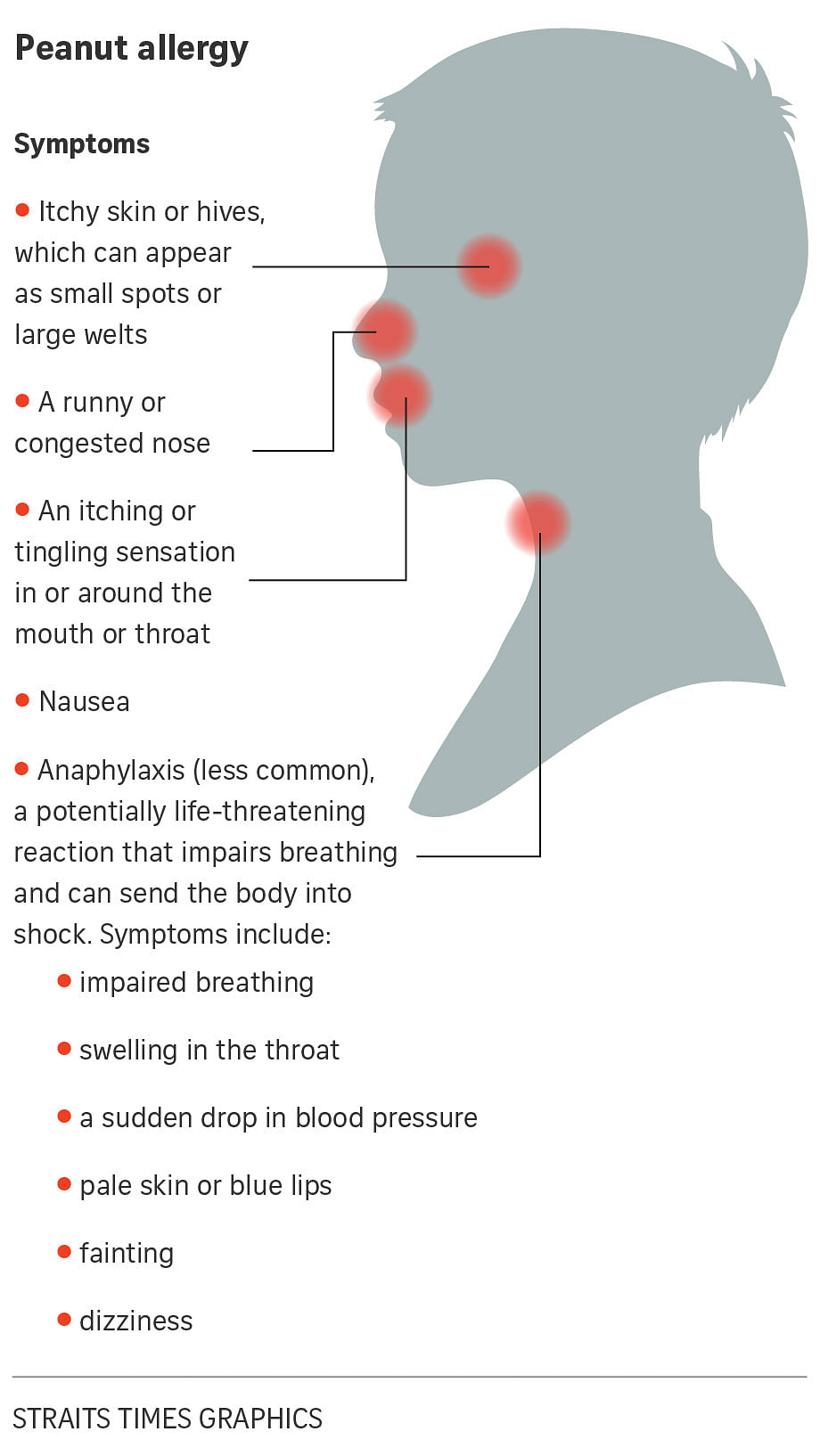Nuts and peanuts can cause allergic reactions which are sometimes severe. This prompts specific blood cells to create antibodies that are then programmed to recognize the threatening proteinin this case peanut protein.

Can You Have A Delayed Reaction To Peanuts Managing Peanut Allergies
The IgE antibodies tend to bind to the surfaces of other cells.

What happens when you have an allergic reaction to peanuts. Your symptoms may start from within a few minutes to a few hours after eating peanuts or peanut products. Speak to your allergy doctor if you have any concerns proximity food challenges can be done by your allergist to help alleviate any questions regarding what happens after exposure to peanut in you or your child. If the person eats something that contains the nut the body thinks these proteins are harmful invaders and responds by working very hard to fight off the invader.
When the immune system considers an invader as harmful then it releases some chemical for attack. A severe reaction to nuts is called anaphylaxis and can be life-threatening. Symptoms often start quickly within an hour of coming into contact with a nut and sometimes within minutes.
If you have a mild reaction you may get a stomachache a runny nose itchy eyes hives or tingling in your lips or tongue. IgE antibodies play an important role in these reactions. An immediate allergic reaction happens within 4 hours of getting vaccinated and may include symptoms such as hives swelling and wheezing respiratory distress.
It receives particular attention because it is relatively common typically lifelong and can cause severe allergic reactions. In healthy people IgE antibodies are only present in small amounts. When someone has a nut allergy the bodys immune system which normally fights infections overreacts to proteins in the nut.
What Happens With a Tree Nut or Peanut Allergy. Peanut allergy is an abnormal response by the immune system to a specific protein present in this legume. Peanuts are a common cause of food allergy caused when the immune system reacts to the protein found in peanuts.
This will cause the release of chemicals that trigger symptoms like itchy hives nausea or facial swelling. Peanut allergy affects around 2 1 in 50 of children in the UK and has been increasing in recent decades. Histamines are released in response of this attack and the symptoms like inflammation itching and redness occur.
Hay fever some food allergies and allergic asthma all trigger type I hypersensitivity reactions. The symptoms that occur when your body is in attack mode can range from hives to nausea and facial swelling to anaphylaxis. Some people may have stomach and digestive trouble or experience other common allergy symptoms such as coughing and sneezing.
Your doctor may refer you to a specialist in allergies and immunology to provide more care or advice. What to do if you have an allergic reaction to peanuts. It usually develops in early childhood but.
This will cause the release of chemicals that trigger symptoms like itchy hives. Symptoms of peanut allergy can range from mild to severe. If you have a peanut allergy your body will work double-time to protect itself from the protein in peanuts that will cause an immune reaction in your body.
If you have a peanut allergy your immune system will launch an attack anytime it senses the proteins in peanuts. In some cases the reaction can be severe and may include facial swelling and trouble breathing. Type I is the most common reaction type.
If youre allergic to them a tiny amount can trigger a major reaction. Physical symptoms of allergic reaction can include itchiness hives swelling eczema sneezing asthma attack abdominal pain drop in blood pressure diarrhea and cardiac arrest. If you have a peanut allergy your immune system will launch an attack anytime it senses the proteins in peanuts.
Even just touching peanuts can. The launching of an allergic reaction on the other hand occurs when the body is subsequently exposed to the protein and the antibodies trigger the biochemical players in the allergic reaction. This is what happens when you have an allergic reaction.
The signs of an allergic reaction to peanut butter typically include skin reactions like hives or eczema. Peanut allergy is the leading cause of anaphylaxis and death due to food allergy. Peanut allergy is one of the most common food allergies in both children and adults.
People with allergies have an excess of IgE antibodies. After you inject epinephrine and your symptoms stabilize go to an emergency room for treatment. The conclusion is that most individuals with peanut allergy will not experience a systemic or respiratory reaction touching inhaling or smelling peanut butter but only through ingestion.
If you are allergic to peanuts you will develop a raised bump or reaction. You may also need a blood test to check to see whether your immune system launches an allergic reaction to peanuts. It is different from tree nut allergies with peanuts being legumes and not true nuts.
Why do you think Mata Hari was used as a spy. Peanuts are a common cause of serious allergic reactions. Learn about getting a different type of vaccine after an allergic reaction.

Dangerous Allergies Anaphylaxis And Life Threatening Allergy Triggers

What To Avoid With A Peanut Allergy

Singapore Airlines To Review Serving Of Nuts On Flights After Toddler Suffers Allergic Reaction To Passengers Eating Peanuts Singapore News Top Stories The Straits Times

Peanut Allergies And Babies Signs And Symptoms Lil Mixins

Origins Of Peanut Allergy Causing Antibodies Science

Peanut Allergies And Babies Signs And Symptoms Lil Mixins

Child With Peanut Allergies Builds Tolerance With Same Food
Peanut Allergy Global Indian Nurses Organization

Serving Of Nuts On Sia Flights Being Reviewed After Boy Suffers Allergic Reaction To Nuts Other Passengers Were Eating Singapore News Top Stories The Straits Times